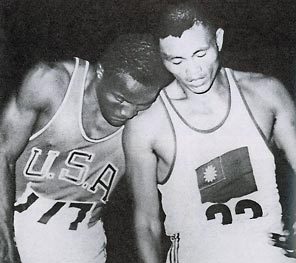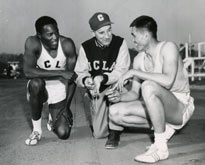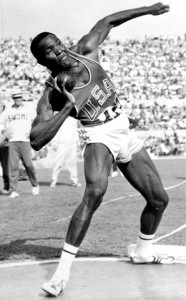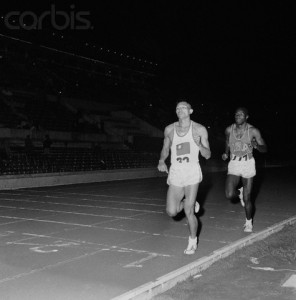1960 Olympic Decathlon: A Duel For The Ages

The decathlon duel between Rafer Johnson and C.K. Yang was the highlight of a star studded 1960 Olympics.
The decathlon is one of the most grueling competitions in all of sport. It consists of ten events, negotiated over two days. Points are awarded based on the order of finish as well as the distance, height or time achieved in each event. Final standings in a decathlon competition are therefore expressed as total accumulated points.
The particular events are designed to test the athlete’s speed, strength and endurance – in essence, an entire track meet in one competition. Because of the versatility and overall athleticism required to win, the Olympic decathlon champion is often referred to as the “World’s Greatest Athlete”.
This is the story of one of the most dramatic battles for that coveted distinction. As you will read, this struggle for gold and glory carried with it some very interesting under currents.
The 1960 Rome Olympics was one of the most memorable in terms of drama, future legends and athletic achievement in all of modern Olympic history. Names like Cassius Clay (Muhammad Ali), Wilma Rudolph, Al Oerter and the Russian sisters Irina and Tamara Press were but a few of the jewels set in the crown of Rome that year.
Among the gathered elite, probably none drew more attention than the top two decathletes in the world at that time: Yang Chuan-Kwang of Formosa (Taiwan) and the American world record holder, Rafer Johnson.
The decathlon in those days had worldwide appeal, due primarily to its dominance during the 1950s by Bob Mathias, who shocked the world by winning the 1948 Olympic gold as a 17 year old kid.
Yang, better known as C.K.Yang, was a member of the Takasago – an aboriginal tribe who inhabited Formosa long before the Chinese arrived. His athletic skill was recognized at an early age. He developed his art to the extent local facilities and competition would permit. He was good enough to finish eighth in the decathlon at the 1956 Melbourne Games. Eventually, track and field officials raised enough money to send him to the U.S. to train.
After a year of extension courses where he acclimated to American culture and learned the English language, he enrolled at UCLA in 1958 at the ripe old age of 25.
Rafer Johnson grew up in the farm country of central California. He was heavily recruited as a high-schooler by every major college football program on the West Coast. However, the above mentioned Bob Mathias who hailed from nearby Tulare, was Johnson’s hero.
And track and field was his passion. That passion had resulted in a silver medal in the decathlon at the 1956 Melbourne Olympics. Johnson shunned the glorious promises and opulent offers of his football suitors and chose the legendary track coach Elvin “Ducky” Drake as his mentor.
Yes, that Ducky Drake – track maestro at UCLA.
Yes, that UCLA – where C.K. Yang was now training and competing.
Is a fascinating picture beginning to emerge?

Johnson and Yang were both pupils of Ducky Drake at UCLA.
Drake suddenly had one of those delicious and dangerous dilemmas coaches only dream about: how does one guide two of the world’s best athletes (in the same discipline) without showing partiality?
“He handled that situation wonderfully. To this day, neither C.K. nor I know which one of us he favored, if he did. That’s why we’ve stayed so close all these years,” Johnson would later say.
“It was a unique relationship, like a father and two sons,” Yang would also later reflect. “And not once did Ducky ever show favoritism to either of us.”
Needless to say, a strong bond of friendship and brotherhood developed between the two athletes and Drake became the father figure.
In a prelude to the hype surrounding their Olympic duel, the two competed at the AAU National Championship meet in Eugene, Oregon that year. This meet provided enough tense drama of its own. After eight events, it came down to Yang and Johnson battling it out for championship honors.
Johnson launched a monstrous 233-foot javelin throw which garnered enough points to break the decathlon world record before the tenth event even began. Sports writers later called his new record total 8683 points “staggering” and “stunning”.
Almost lost in the buzz was the fact that C.K. Yang also surpassed the old record by 69 points in finishing second.
The two friends and rivals easily qualified for their respective Olympic teams.
As the Olympic decathlon got underway in Rome that September, the heavens released a prophetic statement in the form of thunder and lightning.
Rafer Johnson was the thunder – a chiseled physique, who dominated in the strength events – the shot, discus and javelin.
Yang was the lightning – quick and lithe, with a knack for running and jumping.
A heavy downpour drenched the stadium field and track. It was a distinct disadvantage to Yang, as the track was flooded for the 400 meter race and the 16-pound shot was like a greased cannonball in his smaller hand.
“My goal in those days,” recalled Johnson “was to try to keep C.K. from annihilating me in his two best events, the vault and the 1500 meters. Then I would try to annihilate him in my two best events and his two worst events, the shot and discus.”
Johnson did annihilate Yang in the shot and discus but faltered severely in the 110 meter hurdles. Only a personal best in the vault got him back in contention, although Yang won the vault.

Johnson dominated the shot and discus in the 1960 Olympic decathlon, but struggled in the hurdles.
The American held a slim 55 point lead after the first day.
Better weather provided a good back-and-forth skirmish the second day.
“Rafe and I loved competing against each other,” Yang remembered. “We needed each other, in a way.”
The crowd was amused as each athlete politely waited his turn to secretly consult with coach Drake regarding strategy and execution between attempts.
The scorebook revealed that after nine events, Johnson only needed to stay within 10 seconds of Yang in the 1500 meters to win gold.
It was Yang’s best event.
“I figured I had an outside chance to win after nine events,” Yang mused “until I found out Rafe and I were in the same 1500 heat. I knew he would never let go of me unless he collapsed. I knew he would win. He is that way.”

In the 1,500-meter run, the final event of the decathlon, Johnson stayed close enough to Yang throughout the race to ensure that he would bring home the Gold medal.
For nearly three laps Johnson dogged Yang, staying two strides behind. Yang desperately and courageously found another gear on the final lap, trying to shake his shadow.
“I had one advantage,” admitted Johnson ” And I don’t think C.K. knew this at the time – this was my last decathlon. I was prepared to run as fast as I had to in this last race of my life.”
Johnson did not relent, matching Yang’s final kick stride for stride.
Yang’s hoped-for collapse by Johnson finally did come – but only as they crossed the finish line. They fell together in a bittersweet embrace.
Yang won the battle but lost the war.
Johnson victoriously recieved his gold medal on the podium’s highest step as his friend and former teammate accepted the silver.
* * *
Rafer Johnson never competed again. C.K.Yang eventually demolished the decathlon world record with 9131 points in 1963. He also briefly held the world record in the pole vault at 16′-3.5″.
Elvin “Ducky” Drake died in 1988.
Yang summed up this incredible Olympic duel with this short quote:
“It was a remarkable time for all three of us. Same school, same coach, different nations.”
Johnson and Yang remained lifelong friends until 2007, when Yang himself succumbed to a cancer-related stroke.
source credits: Seattle Times
Los Angeles Times
Time Magazine
My grade school coach, Phil Mulkey, was also there in Rome for the 1960 decathlon. I saw him within the last yearor so, and he relived the 2 day event and told me that he was in contention during the first day but pulled a hamstring or something and dropped out of the hunt.
Bruce F.
St. Dominic in Memphis. .. me too. Jeff Bowler remembers coach mulkey
I¡¯ve already bookmark this article and will definitely refer this article to all my close friends and colleagues. Thanks for posting!
not much said about the personal life of Rafer Johnson . . . . . did he have a wife? . . . . children? . . . . where does he live now?
Very efficiently written information. It is going to be priceless to anybody who usess it, including myself. Sustain the nice work – for positive i will check out more posts.
You really make it seem so easy together with your presentation but I in finding this matter to be really something which I believe I would by no means understand. It seems too complicated and extremely huge for me. I am having a look ahead to your subsequent put up, I will attempt to get the hang of it!
Great blog right here! Additionally your site rather a lot up very fast! What web host are you the use of? Can I am getting your associate link in your host? I desire my site loaded up as quickly as yours lol
That is very attention-grabbing, You are a very professional blogger. I’ve joined your feed and look forward to looking for more of your magnificent post. Additionally, I have shared your website in my social networks
Hi there to all, the contents present at this web site are actually remarkable for people
experience, well, keep up the good work fellows.
my weblog – new game
I love to play games. I really like your post. thanks for sharing.
http://psugovtjobs.in/drdo-jrf-and-research-assoc…